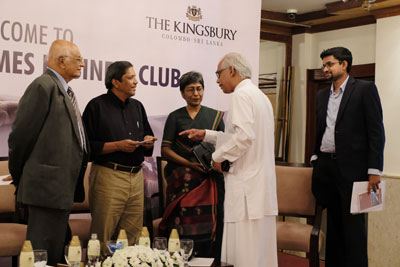Daunting challenges: Annual $4bn loan repayment in 2019-2021
Sri Lanka is facing daunting challenges ahead, one particularly being the repayment of loans amounting to US$4 billion per annum in the next three years (2019-2021).

Panellists discussing some points
Outlining these challenges, State Minister of Finance, Eran Wickramaratne told an economic discussion that the Government has nevertheless stuck rigidly during the past three years where revenue consolidation was concerned to bring the budget deficit down.
“We have not seen a significant growth, as growth levels are much below expectations. Foreign Direct Investment (FDI) was within the range of $2 billion whereas it should be in the range of $4 billion,” he told the monthly meeting of the Sunday Times Business Club (STBC) at the Kingsbury hotel Colombo last week where the country’s economic fundamentals came under scrutiny by an eminent panel comprising veteran economist Dr. Nimal Sanderatne, IPS Executive Director Dr. Dushni Weerakoon and Ceylon Chamber Chief Economist Shiran Fernando.
Earlier Dr. Sandaratne, who was also the moderator, said economic fundamentals is a hot topic being discussed currently by many these days.
“We are addressing an issue whether fundamentals of the economy are strong enough to withstand the onslaught of the global financial developments.” He said the discussions they have had were recently coloured and prejudiced by political considerations.
There have been exaggerations by those who should have known about economics, have coloured their comments from a political angle, he explained.
“As a result we have views that are not data-based and views that are not based on reality of the situation and views that are not taken into consideration by the antecedents of the problem nor the global dimension,” he said, adding that Sri Lanka is a country where ideological considerations have become more important than adopting a more pragmatic approach to solve its problems.
GDP growth down
State Minister Wickramaratne said they had to face a lot of challenges during the period in which they have been in power since 2015.
He said the GDP growth rates of the country have come down although the agriculture sector has not contributed enough in terms of the GDP of the country. The manufacturing sector had not grown significantly during the past 30-40 year period. Although the contribution of the agriculture sector was about 9 per cent of the GDP about 28-30 per cent of the workforce was involved in this sector.

Question from the audience. Pix by Amila Gamage
“However its impact on the population was much bigger.” Farmers in the rural areas such as Monaragala district have pointed out that their most important need was the availability of water. They have pointed out that rehabilitation of neglected water tanks was a prerequisite to conserve water for 2-3 cultivation seasons.
Mr. Wickramaratne said the macro –economic challenges the country faced was with regard to migrant labour whether farmers would enter other areas such as the manufacturing and service sectors. He said the other issue the government had to face was with regard to the big budget deficit which was brought down to 5.5 per cent of GDP last year. As far as revenue was concerned it should have been much higher as against the GDP and taxation had been going down during past one and a half decades.
“But we are going in the right direction where revenue consolidation was concerned.”
The Minister further said that as smaller economies are integrated to global economies and the impact of trade disputes between the US and China and Europe, the instability in West Asia will have an effect on foreign investments. He also sounded a note of caution where political pressure was greater as the election period was approaching within the next few years.
Growing risks
Dr. Weerakoon from IPS, taking a snapshot view of the economy, said the risks to the Sri Lankan economy in the coming years were going to be more challenging.
The currency crises was not confined to Sri Lanka but impacting other Asian countries as well. The threat to the Sri Lankan economy was more owing to the volume of outstanding external debts that has to be paid.
When currency depreciates the fiscal position gets impacted. Sri Lanka had $10 billion as foreign reserves in April this year which is now down to $7.2 billion.
Currently the reserves that the Central Bank holds is sufficient for four months of imports and the danger threshold lies when it goes down to three months of imports.
The external risk was when oil prices go up. When the US interest goes up the investors will pull out their investments to invest in the US.

The risk to the rupee from the external front was high and the growth next year is going to be around 4 per cent. She said international investors would scrutinize the economy and will take a hard look at political risks involved and take a wait and see policy. Therefore it was necessary to safeguard the fiscal policy from political pressure when elections are around the corner. She stressed the importance of reskilling the ageing labour with modern technology. Some 60 per cent of the labour force was in the informal sector and training in technological adaptation was necessary and many reforms were necessary to make the export sector viable.
Crisis of confidence
Ceylon Chamber’s Fernando said the external picture of the economy has taken a worse turn and the Central Bank has to be more vociferous in what they say about the economy.
Asking the question whether Sri Lanka is in an economic crisis, he himself gave the answer, saying “No”. “However is there an element of confidence? Then the answer is ‘Yes’; there is a crisis of confidence,” he noted.
“It is difficult to see a stimulus coming from the budget as there is going to be more on the consumption pattern.” From the external side it is a concoction of different factors that come into play. He said when the US Federal Reserve raised its interest rates it is always associated with a crisis situation globally.
Referring to Vietnam, he said that they were able to weather the currency crisis by luring Chinese investors to the country. The two countries that are suffering the ill effects of the currency crisis are Indonesia and Sri Lanka. He said the diaspora community should be encouraged to come back to set up IT related industries. As far as the Sri Lanka –Singapore Agreement’s Service sector was concerned many of its provisions have been misinterpreted by some quarters.
In summing up the discussion, it was noted that although the fiscal situation has improved, exports are growing and inflation is low, the large foreign debt and high debt servicing costs poses serious economic challenges. The economy is in a vulnerable position as it has not performed adequately and several economic fundamentals are weak.


